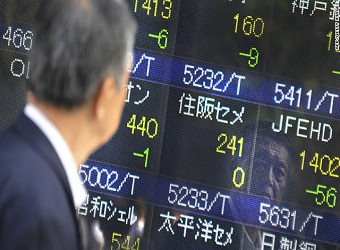Stock markets in Asia ended mostly lower on Friday, despite an agreement from major oil producers at an OPEC meeting to extend output cuts for an additional nine months.
The production cuts of 1.8 million barrels a day, first agreed on in November last year, will now extend to March 2018, the group decided at a meeting in Vienna on Thursday. The OPEC-led output cuts are targeted at rebalancing the global overhang in the oil markets, which saw oil prices fall by more than half in recent years.
Oil prices fell by almost 5 percent in the last session following the news as some investors had been hoping for deeper production cuts. U.S. crude had traded above the $50 mark for most of the week in anticipation of the OPEC meeting.
On Friday afternoon during Asian hours, oil prices traded modestly higher. Global benchmark Brent added 0.31 percent to $51.62 a barrel, while U.S. crude was up 0.16 percent at $49.98.
“Oil was practically begging to be knocked off its perch after rallying into the OPEC meeting with wide expectations (for) extended cuts. As the extensions were estimated to be around nine to twelve months, OPEC needed to far exceed this time horizon for oil to sustain its rally,” ThinkMarkets Senior Market Analyst Matt Simpson wrote in a Friday note.
Political developments in the U.S. could also potentially rattle markets after it was reported by NBC News that Jared Kushner, the son-in-law and senior adviser of U.S. President Donald Trump, was now under FBI scrutiny in its Russia probe.
In Japan, the Nikkei 225 closed down 126.29 points, or 0.64 percent, at 19,686.84, while across the Korean Strait in South Korea, the Kospi gained 12.37 points, or 0.53 percent, to 2,355.30.
Down Under, the S&P/ASX 200 fell 37.92 points, or 0.66 percent, to 5,751.70, driven by losses in the energy and materials sectors, down by 1.71 percent and 1.26 percent respectively.
Markets in greater China were nearly flat; the Hang Seng Index in Hong Kong traded nearly flat in late afternoon. The Shanghai Composite finished at 3,110.16, while the Shenzhen composite was at 1,810.11.
Troubled Japanese conglomerate Toshiba announced KKR, SK Hynix, Broadcom and Hon Hai Precision had submitted bids for its memory chip unit. The company suggested it had received offers that were higher than 2 trillion yen ($17.9 billion), the Nikkei reported. Toshiba shares closed down 0.35 percent.
Citi analyst Nobuyoshi Miura upgraded his call on shares of beverage manufacturer Yakult Honsha to a “Buy,” citing better volumes in China and Japan in 2016 and expectations for sales growth going forward. Shares of Yakult rose 1.31 percent.
Hong Kong-listed Lenovo Group slumped 3.17 percent in late-afternoon trade. The world’s largest maker of personal computers reported it was back in the green for the year to March, but cautioned about problems in the short-term.
Over in Malaysia, low cost carrier AirAsia tumbled 2.88 percent after reporting a 30 percent fall in quarterly net profits on year, which the company attributed to higher fuel costs.
Nevertheless, AirAsia Group CEO Tony Fernandes told CNBC that he was positive about the company’s earnings in the quarters ahead.
Meanwhile, the dollar strengthened against a basket of rival currencies to trade at 97.217 at 3:08 p.m. HK/SIN, off lows of 96.880 touched in the last session. The dollar softened against the yen to trade at 111.31. The greenback had been on the defensive following the release of minutes from the U.S. Federal Reserve’s May meeting.
Commodity currencies slipped against the dollar following yesterday’s OPEC meeting. The Aussie dollar traded lower against the dollar after breaching the $0.75 handle yesterday. The Aussie traded at $0.7439 at 3:08 p.m. HK/SIN.
In economic news, Japan CPI for the month of April increased 0.4 percent on year, in line with analyst forecasts.
Stocks on Wall Street closed higher following strong gains in tech stocks, with the Nasdaq rising 0.69 percent, or 42.23 points, to close at 6,205.26. U.S. markets will be closed for a long weekend due to the Memorial Day holiday on Monday.
Source: CNBC


